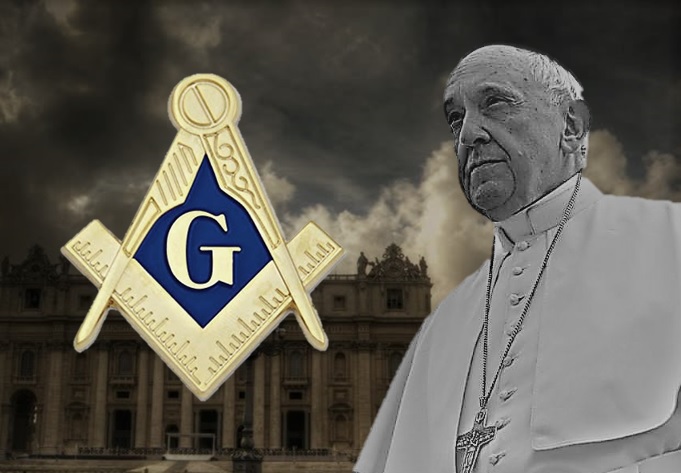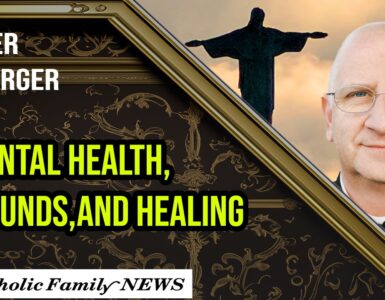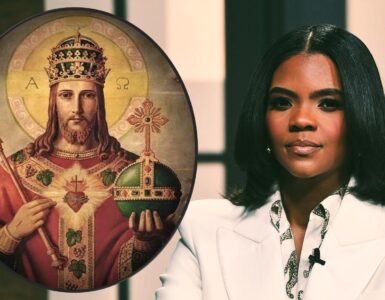Pope Francis’ recent visit to Abu Dhabi (Feb. 3-5), capital of the United Arab Emirates (UAE), was a disaster for the Catholic Faith, as was the downplaying, ignoring, and attempt to explain away his grossly un-Catholic remarks by mainstream Catholic media personalities.
The trip and the commentary written about it indicates the crisis in the Church is getting worse and that the number of Catholics willing to tell the truth and risk losing human respect is diminishing.
Pope Francis Fails to Mention Jesus
Not once during his lengthy speech at the UAE’s Human Fraternity Meeting (Feb. 4) did Pope Francis mention the Most Holy Name of Jesus, the Name which the devil hates to hear, demons hide in terror of, and whose Name priests invoke to cleanse possessed souls.
Instead, the Pope spoke generally about “the Creator” and “the Merciful One” while imploring his listeners to build a world founded not on the Social Kingship of Christ but on “fraternity” (mentioned 15 times), “brotherhood” (mentioned 13 times), and “justice” (mentioned 9 times).
Some Catholics might think this is perfectly acceptable behavior. Highlighting offenses to human dignity, engaging in dialogue, and drawing attention to what Catholics have in common with Muslims (as oppose to referring to them as members of a sect, as St. Thomas Aquinas did) is what any responsible Successor of St. Peter would do in the modern, globalized age. “The Pope is a public figure. He has a duty to maintain good relations with the different peoples of the world,” one often hears.
In reality, this warped, pope-as-globetrotting-politician-in-chief mentality forgets several key teachings of the Catholic religion.
One, rounding off the edges of the Faith so as to pursue common political cause with non-Catholics was the chief mistake of the Americanists in the 1890s. Two, the primary duty of the Pope is the teaching of Catholicism in its fullness and the anathematizing of erroneous doctrines. Three, while the Pope can play a role in maintaining a certain level of natural harmony among nations, he is not allowed to do so at the expense of the Faith. He is obligated first and foremost to preach the Gospel clearly, in season and out (cf. 2 Tim. 4:2), accepting all persecutions as a result of doing so, knowing full well that Christ was also hated by the world (cf. John 15:18-19).
Further, God desires all men to be Catholic. It would be the height of absurdity to say the Pope should temporarily pause the divine mandate to proselytize all nations because the world has plunged itself headlong into heresy. If anything, such a situation should compel him to be an even more zealous missionary for souls.
Christ, Not ‘Fraternity’, Safeguards Peace
If the Church today was led by a holy pope, and ecumenism, modernism, and liberalism had not yet given her theological AIDS, those who attended Pope Francis’ speech in Abu Dhabi would have been encouraged to leave behind their false ideas and embrace the Catholic religion.
Quite obviously, this did not happen.
Far from emulating St. Francis of Assisi, who, in the 13th century, tried to convince Sultan al-Kamil to follow Christ, Pope Francis told his audience: “Today, we too in the name of God, in order to safeguard peace, need to enter together as one family into an ark which can sail the stormy seas of the world: the ark of fraternity.”
In other words, forget Jesus Christ. Forget the sacraments. Stay where you are. Fraternity is our guide.
But how can men have peace without the Prince of Peace? They can’t. Not only does Psalm 127 tell us those who build without the Lord “labor in vain,” Pope Pius XI, in his 1925 encyclical Quas Primas, teaches that only when men recognize, “both in private and in public life, that Christ is King, society will at last receive the great blessings of real liberty, well-ordered discipline, peace and harmony” (n. 19).
Basic Catholic doctrine also holds that the Catholic Church is the Ark of Salvation that God gave to man, in which man is meant to “sail the stormy seas” of his fleeting existence on earth. True and lasting peace occurs when men fulfill Christ’s prayer that “all may be one” (John 17:11) and enter into that ark, and not into the rickety, glued-together paddle boat Modernist Rome is constructing with the enemies of God. The Jesus-free project of which Francis’ Masonic remarks speak is doomed from the start.
The One Big ‘Human Family’ Is Not Catholic
Despite the Pope’s contention in his statement that they are “brother and sisters,” Catholics and Muslims aren’t either of these in any real sense.
Ephesians 2:3-5 tells us we are all born “children of wrath.” It is through Baptism that we are liberated from Satan and incorporated into the chosen family of God. In other words, Baptism means we leave behind the pagan “human family” and become part of the divinely-established Mystical Body of Christ.
Islam denies Original Sin. It denies the divinity of Jesus Christ, rejects that God is three-in-one, and it does not honor Mary the way in which God desires. Brothers and sisters typically honor the same mother and are part of the same family. But it is clear that Catholics and Muslims are not.
Odious, as well, is Francis’ assertion that “the desire to affirm oneself and one’s own group above others” is “the enemy” of fraternity. As is his claim that, “each belief system is called to overcome the divide between friends and enemies, in order to take up the perspective of heaven, which embraces persons without privilege or discrimination.”
Perhaps there’s a translation error here, but since when do Catholics believe the “great pearl” (Matt. 13:46) that they possess is just one of the many “belief systems” in existence? Did the great martyrs of past ages die for a mere “belief system”? Of course not. As Pope Pius IX wrote in Qui Pluribus in 1846, “the Christian faith is the work of God.” Islam, on the other hand, is a bloodthirsty man-made cult.
Furthermore, since when does Heaven not discriminate against who it lets in? Scripture is crystal clear in saying time and time again that those who deny Christ will be thrown into the abyss. “Depart from Me, you that work iniquity” (Matt. 7:23).
Christ, in fact, affirmed that His “own group” of followers were “above” other groups of men when He told His disciples to teach Catholicism to all nations. “I am the way, the truth, and the life. No man cometh to the Father but by Me,” He explains in the Gospel of John (14:6).
God Does Not Will a Diversity of Religions
The Pope’s monstrous betrayal of the heart of the Gospel in his blasphemous speech is only made worse by his signing of a “Document on Human Fraternity for World Peace and Living Together” with Sheikh Ahmed al-Tayeb, the Grand Imam of Al-Azhar in Cairo.
Waxing and waning about what tomorrow’s worldwide utopia will look like, the document astonishingly declares, “Freedom is a right of every person…The pluralism and the diversity of religions, color, sex, race and language are willed by God in His wisdom, through which He created human beings. This divine wisdom is the source from which the right to freedom of belief and the freedom to be different derives.”
Whatever happened to the rights of God over His creatures to be worshipped according to the teachings of the religion He established? Wasn’t diversity of languages punishment for building the Tower of Babel?
Essentially, what this document amounts to is Jesus standing next to Mohammed and co-authoring a statement that says the two of them are brothers and that everyone in the world is free to follow or reject either of them.
Despite the document’s obvious assertion that religious pluralism is “willed by God,” not a few neo-conservative Catholics lept into action to tell us illiterates just what the Pope was probably, really, trying to, sort of, actually say in it.
“We must seek a way to understand this without it sounding like heresy,” Fr. John Zuhlsdorf pleaded on his blog. “If you read the statement to mean that by God’s positive or active will there are a multiplicity of religions, that’s an error.”
“Were one to choose to” read the document as saying “that God willed a diversity of religions not just by His permissive will but by His active, positive will,” then “[t]hat would be contrary to reason and the Catholic Faith,” he later wrote.
Wait, what? It’s the readers’ fault for not understanding this noxious document in an orthodox way? Imagine taking this sort of approach while you were a student. “I must seek to understand how Mrs. Marilee’s claim that 2+2=5 isn’t wrong. Although last year Mr. Gravely said 2+2=4, maybe she has some deep insight that can enlighten me. If I don’t come up with how to reconcile these two teachings, then I am the one in the wrong and not my teachers.”
Catholic University of America professor Chad Pecknold trotted out another worn-out conciliar strategy when he told the U.K.-based Catholic Herald that, “in the context of the document, the Holy Father is clearly referring not to the evil of many false religions, but positively refers to the diversity of religions only in the sense that they are evidence of our natural desire to know God.”
“A diversity of religions can be spoken about as permissively willed by God without denying the supernatural good of one true religion,” he added.
Sorry. This permissive will nonsense is not what the document speaks about.
A Dominican theologian speaking anonymously to LifeSiteNews recently clarified Church teaching on the matter. “God permits non-Catholic religions to exist; but permitting something is not a way of willing it, it is a way of not willing to prevent it. Thus God permits many innocent people to be killed, but He does not will it.”
Catholic apologist Taylor Marshall also picked up on the absurdity of what was going on by tweeting, “We faithful shouldn’t have to jump through theological hoops in order to make the Pope of Rome sound like an orthodox Catholic. Most of us are fatigued by it. I tried it for years. ‘Context! Mistranslation! Well it could mean this!’ No more #popesplaining.”
There is no divine duty imposed on Catholics to try and read something a member of the clergy says in a particular way so it doesn’t “sound like heresy.” The “truth will set you free” (John 8:32) is the only guide Catholics have. If what a priest, bishop, cardinal or pope puts forth is obviously against the Faith, it deserves to be challenged and if necessary rebuked and corrected.
Placing the burden of understanding Francis’ wholly heterodox remarks so the so-called “hermeneutic of continuity” isn’t violated is a deliberate tactic meant to deflect from what was actually said. It’s a cheap, intellectually dishonest way of avoiding the crux of the matter and laying the blame on the person reading it instead of the actual words. It’s a not-so-subtle form of gaslighting that emanates from fear and a lack of fortitude.
It’s perfectly reasonable to not want the Pope to utter something heretical, but if he does, Catholics are bound to defend the dignity of God first and foremost rather than play the “everyone calm down, nothing to see here” card.
Francis’ remarks are on their face patently unjust and terribly offensive to the Almighty in the most obvious manner. Any Catholic who loves the Faith and the Pope will urge him to retract his statements and explain where they are wrong. Performing theological acrobatics so not to get Catholics alarmed about the Pope’s remarks reflects the wisdom of man and not the wisdom of God. Catholicism is the only religion willed by God.
Vatican II Is the Real Culprit
As noted by Professor Roberto de Mattei, at the heart of Francis’ remarks lies the tripartite flag of Freemasonry — liberty, equality, and fraternity.
Whereas Freemasonry holds that man has no need of Baptism and has a natural right to religious liberty and to say and do pretty much anything his conscience tells him, Catholicism holds that error has no rights, that man’s first liberty is from the bonds of Original Sin through Baptism, and that he is obliged to conform his conscience to the religion established by Jesus Christ.
Whereas Freemasonry holds that all men (and religions) are equal, that man is sovereign and totally independent of Jesus Christ in political affairs, and that no one person or group of persons is superior to another, Catholicism holds that it is the one true religion, that inequalities and a hierarchy exists among men, and that political authority rests with God.
Whereas Freemasonry holds that all men are naturally brothers in a worldwide fraternity under the Grand Architect of the Universe, Catholicism holds that men become spiritual brothers after incorporation into the Mystical Body of Christ under the divine paternity of the Triune God.
When one reads Francis’ remarks and the statement he signed with the Grand Imam, it is clear he is espousing the principles of Freemasonry. “Freemasonry continues to be condemned by the Church, even if the men of the Church, at the highest levels, seem to embrace its ideas,” Professor de Mattei has observed.
And just where did Pope Francis take his cues from? On his plane ride back to Rome, he admitted the document he signed was inspired by the Second Vatican Council. “This I emphasize clearly. From the Catholic point of view, the document does not pull away one millimeter from Vatican II, which is even cited a few times. The document was made in the spirit of Vatican II.”
The effort now must be to continue insisting on the return of Pope Francis to Tradition and to call upon him to give up the Council and affirm his brethren in the Faith. The faithful have the right, in justice, to a pope who does not spread Masonic principles.
Fr. David Pagliarani, Superior General of the Society of St. Pius X, has been exemplary on this issue in recent months. Below are just a few of the comments he has made:
“It is the duty of the Pope to transmit faithfully the Deposit of Faith. The Pope must therefore put an end to the terrible crisis that has shaken the Church for the last 50 years.” (Source)
“The Pope should declare the decree on religious liberty erroneous and correct it accordingly. We are convinced that one day a Pope will do just that, and return to the pure doctrine that was the reference before this Council.” (Source)
“The questions of religious liberty, ecumenism and the divine constitution of the Church were all dealt with by Popes prior to the Second Vatican Council. It suffices to revive their teachings.” (Source)
“Collegiality places the Church in a permanent situation of a quasi-council, with the utopia of being able to govern the Universal Church with the participation of all the bishops of the world….this revolutionary doctrine is fundamentally contrary to the monarchical nature of the Church.” (Source)
“One day, a pope…will take things in hand and all that needs to be corrected, will be corrected.” (Source)
Let us pray Pope Francis heeds the advice given to him by Fr. Pagliarani. Not only for our sake, but for his own.




